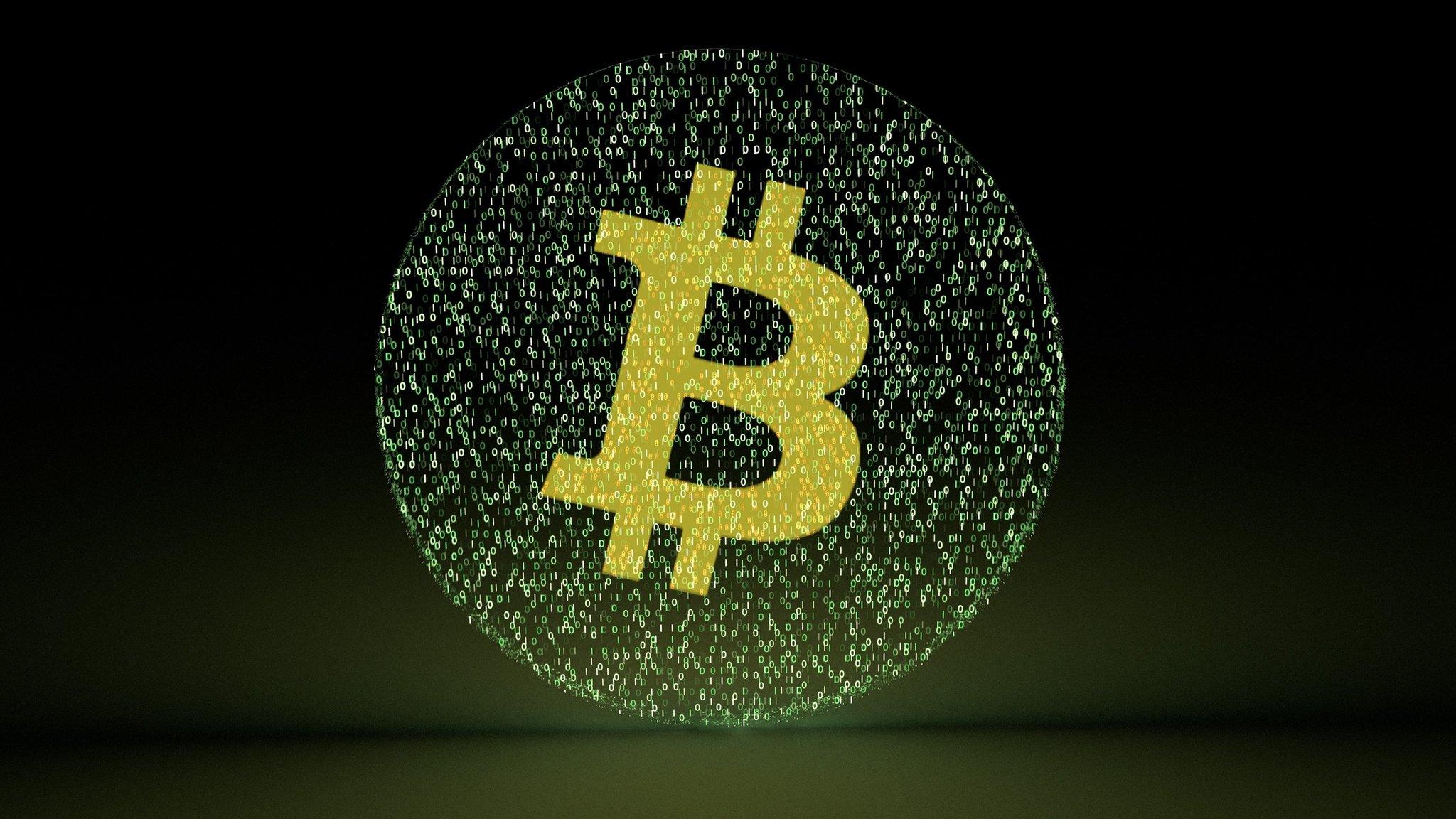Retailers look to Bitcoin as currency for life's basics
- Published
Andy James has only had two Bitcoin customers at his newsagents in Swanage
In the seaside town of Swanage, "cash only" signs still pepper the high street shops and cafes.
Bank transaction charges and problems with phone lines have led some to reluctantly abandon accepting any other form of payment, even during the lucrative summer holidays.
But one local business has decided to embrace a controversial alternative.
Nestled beside the small ads noticeboard in the crowded shop window of Swanage News is a small sticker that reads "Bitcoin accepted here".
The so far unregulated digital currency has courted controversy because of its volatile value and its popularity among cybercriminals.
With that track record, can it ever become an everyday essential?
Chocolate sale
Newsagent owner Andy James hopes so. He decided to look into accepting payments in Bitcoin last month after hearing about it on a TV show.
He is hoping his service will be a hit with the many tourists who flock to this part of the Jurassic Coast, in southern England, at this time of year but so far his only two Bitcoin customers have both been local.
"The first transaction we ever did was for a Kit Kat for 65p," he said.
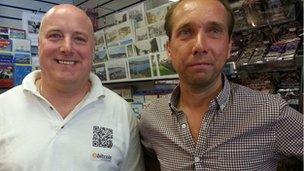
Andy James with his first Bitcoin customer Scott Green
"The gentleman put it down on the counter and asked to pay by Bitcoin, It was really busy in the shop at the time and we thought he was joking, but he wasn't. It was very exciting."
Perhaps appropriately, given the currency's capricious exchange rate, Mr James's other customer spent his Bitcoin on lottery tickets.
"We were hoping they would be winners... but we don't think they were," he says ruefully.
There are many apps and software solutions available for retailers who want to take Bitcoin.
Mr James chose an app that, like many others, converts the price from sterling into Bitcoin and then generates a QR code for the customer to scan with their smartphone.
This completes the transaction from their digital wallet into his.
The Coin of Sale app was created by Tomas Forgac in Singapore.
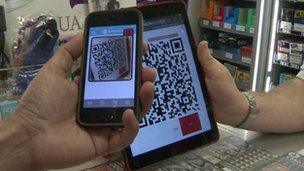
The app generates a QR code for the customer to scan with their phone
Mr Forgac's European clients include sandwich chain Subway's outlets across the Czech Republic.
He says he uses Bitcoin for most of his business expenses.
"The keyboard I'm typing this answer on and memory I added to the laptop this week have been bought with Bitcoin," he emailed.
"I pay my utilities and phone bill, air-con cleaning with Bitcoin and all company expenses are in Bitcoin (server hosting, printing etc)."
£900 bar bill
But in the UK it seems Bitcoin users are more interested in spending their virtual currency on having a good time.
"So far [our] largest transaction was a £900 bill in a bar," Mr Forgac said.
Pub chain Individual Pubs has also found that drinkers are happy to open up their digital wallets.
The company has had a good response since it started accepting Bitcoin payments in June last year, taking £750 in the first two weeks.
Director Stephen Early says he has been surprised by the level of interest, and the chain now averages around £1,000 a month in Bitcoin transactions across its five establishments in Norwich, Cambridge and Hackney, London.
"It's only a small part of the business," he wrote on the company website.
"It's obviously still enthusiasts who have heard about it on the net."
Turnover may be comparatively small but even large brands such as razorblade giant King of Shaves say it feels significant.
Chief executive and founder Will King says the company, which has a multimillion-pound turnover, has processed 15 orders totalling around $1,000 (£599) since it started accepting Bitcoin last month.
"I think it's huge," he told the BBC. "People are as dismissive of Bitcoin now as they were of Twitter in 2007.
"People need to stop thinking of it as a bet. It's an elegant piece of friction-free currency that doesn't wear away like a £5 note does."
If there is a financial revolution taking place, Swanage News may be a bit ahead of its time locally - holidaymakers were out in force in the town but hardly any of the ones I spoke to had even heard of Bitcoin, let alone invested in it.
Mr James remains optimistic.
"It's worth doing. Obviously it's a new thing at the moment and people have to get used to it," he said.
"We've had loads of interest. A few people have asked how they can get hold of Bitcoins for the future, to come in next time they're down."
For now he is relying on traditional sales techniques to drum up trade.
"We're offering a discount on certain products for people if they pay by Bitcoin," he added.

How Bitcoins work
Bitcoin is often referred to as a new kind of currency.
But it may be better to think of its units as being virtual tokens that have value because enough people believe they do and there is a finite number of them.
Each bitcoin is represented by a unique online registration number.
These numbers are created through a process called "mining", which involves a computer solving a difficult mathematical problem with a 64-digit solution.
Each time a problem is solved the computer's owner is rewarded with bitcoins.
To receive a bitcoin, a user must also have a Bitcoin address - a randomly generated string of 27 to 34 letters and numbers - that acts as a kind of virtual postbox to and from which the bitcoins are sent.
Since there is no registry of these addresses, people can use them to protect their anonymity when making a transaction.
These addresses are in turn stored in Bitcoin wallets, which are used to manage savings. They operate like privately run bank accounts - with the proviso that if the data is lost, so are the bitcoins contained.

- Published3 October 2013
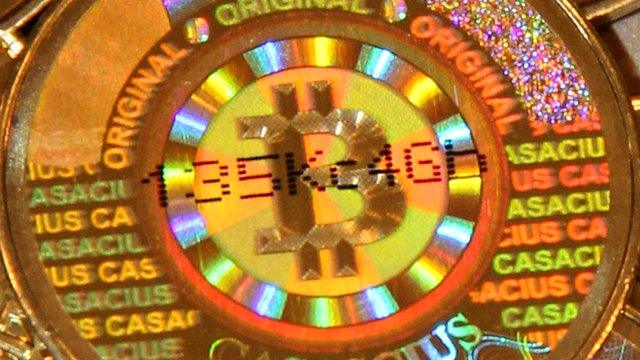
- Published6 August 2014
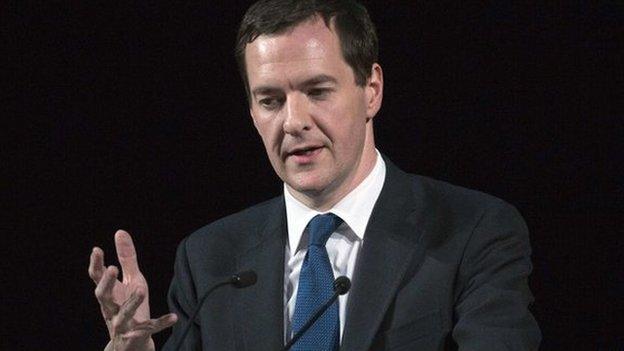
- Published12 June 2014
